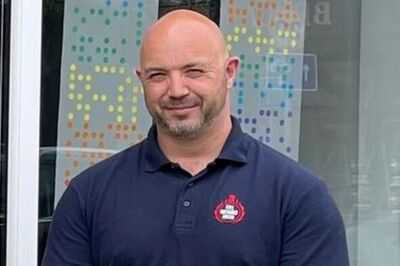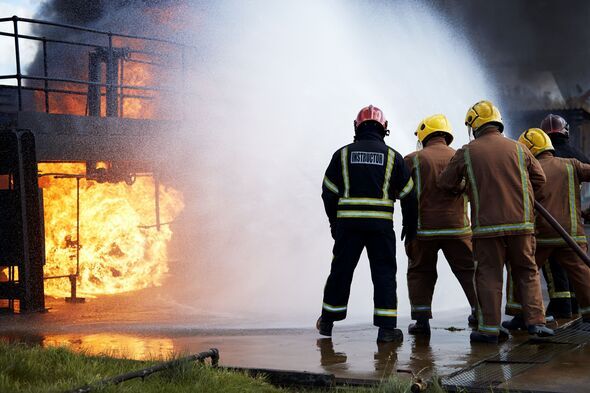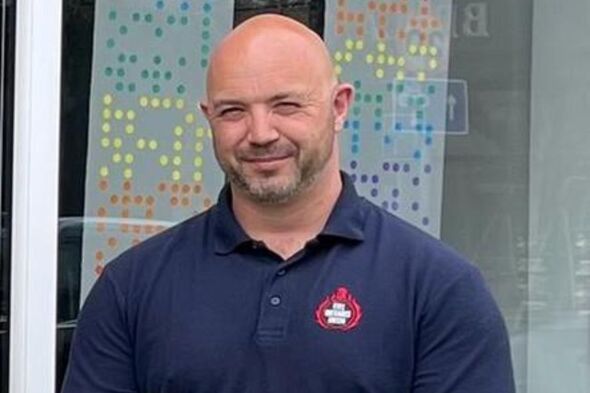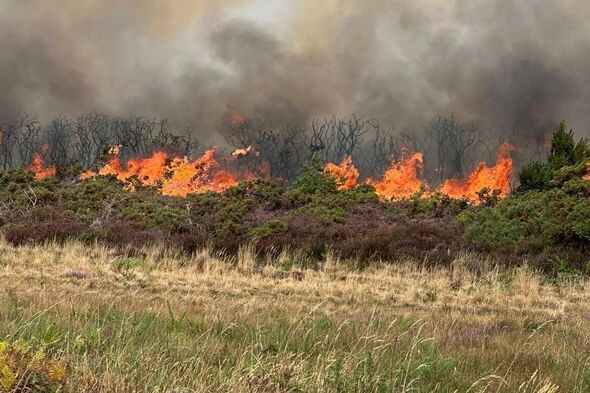

Labour's proposal of "disgraceful" cuts to England's fire services will "cause people to die", officials and on-the-ground firefighters have warned. Years of underfunding has left fire authorities around the country in an incredibly difficult financial spot, with investment plummeting by around £1 billion in the last decade and staff numbers dropping by a quarter in seven years - the equivalent of losing 11,000 full-time staff. But changes put forward in Rachel Reeves' Spending Review could cut a further £1.6 million from frontline services over the next three years, causing an estimated 2,300 job losses, according to modelling by the National Fire Chiefs Council (NFCC).
Fire authorities are also projected to receive 4.3% of the total local government funding allocation under Labour's reforms, down from 4.9%, the NFCC said. Mark Chapman, 47, who has worked as a firefighter in Portsmouth, Hampshire, for 25 years, said such measures, in a record-breaking year for wildfires, with around 900 recorded so far - would push overstretched emergency responders to "the point of critical failure". "There has been a huge negligence of government funding for the fire and rescue service," he told the Express. "The public and firefighters have been let down. We are already on our knees, and yet the conversation isn't about injecting more money into this life-saving resource. It's about making more cuts."

Mr Chapman, who is also southern regional secretary for the Fire Brigade Union (FBU), has led a campaign against proposed cuts to frontline services in Hampshire and the Isle of Wight of £1.6 million - an attempt by the regional authority to plug a deficit caused by chronic underfunding alongside rising wage, fuel and equipment procurement costs. The government would need to produce around a million pounds to prevent frontline cuts in the regional fire service.
Since 2010, the fire authority has lost one in 10 of its frontline workers and has a three-minute slower response time to emergency call-outs than in the 1990s. Financial constraints have also seen the force enact so-called 'degradation plans', temporarily reducing available resources because of low crew numbers.
Such measures were in place on Saturday, August 24, with just 19 fire engines available across the region and only three on the Isle of Wight. That afternoon, all three were committed to tackling a single shed fire. Exactly 24 hours later, a tragic helicopter crash on the island gained national attention when three people died and one was critically injured. If it had happened the previous day, Mr Chapman said, no vehicles could have attended.
"This isn't a new thing," he added. "Since austerity was introduced in 2010, we've seen year-on-year funding cuts. But the public deserve better. They're not paying any less. In fact, they're paying more, because council tax precepts are going up. The financial hole is coming from central government. That's where the change needs to happen."
While firefighter numbers in England have plunged by 25% since 2008 - the equivalent of 11,000 jobs - the number of incidents is on the rise, with 600,185 in 2024, a 22% increase from a decade ago. The disparity means crews are dispatched across the country to respond to unmanned incidents - but the further they have to travel, the longer the wait time and the higher the risk to life.
Fire engines had to journey 20 minutes to the scene of a fire in Petersfield in July, which ultimately ripped through three properties, and vehicles from as far as Merseyside were dispatched to help tackle a fire in Holt Heath, Dorset, earlier this month. Travelling further afield also means fire services are less prepared to deal with local incidents, including road traffic collisions and house fires.
"As someone who has been a firefighter for 25 years, this is absolutely terrifying for me," Mr Chapman said. "I understand exactly how difficult the existing situation is, and what any further cuts would mean for my family, my friends who live in the area, and the community. There would be huge ramifications."
Val Hampshire, 62, FBU officer for the southwest, who oversees Dorset and Wiltshire, added: "We're in a crisis, right across the country, and the government needs to sit up and take note. If any more cutbacks are made, the outcome will be people dying. That is an absolutely outrageous situation to be in in 2025."
"The government appears to expect us to do all the things we do now, but with less money, less equipment, less firefighters and less stations," Ms Hampshire said. "It is just not possible."

"We appreciate that the government has an unenviable task of trying to balance budgets, but these cuts would have very serious repercussions," Phil Garrigan, chair of the NFCC said. "If our worst fears are realised, the majority of services across England will have to make cuts in some way, shape or form.
"All of them will be really challenged to meet their budgetary pressures without cutting firefighter numbers. What we really don't want to see is a significant loss of life caused by the cuts, and then a realisation that we have gone too far and need to backtrack."
Mr Garrigan had been hopeful the new Labour Government would signal renewed investment into fire services following years of cuts at the hands of the Conservatives. "It is disappointing," he said. "We were optimistic, and so far, that hasn't come to pass. But all we can do is keep pushing these issues and keep asking for more investment, which is desperately, desperately needed."
Steve Wright, FBU general secretary, took a harsher tone and warned that "time is running out for Labour to demonstrate that it can provide a meaningful alternative to Tory austerity".
"It is simply disgraceful that the government is imposing cuts on this scale, having come to power promising change," he said. "Cuts to the emergency services will cost lives. It is a matter of time until someone dies - either because we don't have the resources to meet them in time, or because cuts mean firefighters being put in harm's way.
"The UK has a record number of billionaires. The average FTSE 100 CEO takes three days to earn a firefighter's whole annual salary. There is a clear alternative - introduce a wealth tax, rebuild our public services and create an economy for workers."
Rob Cole, Assistant Chief Fire Officer for Hampshire and the Isle Wight, said: "Fire services nationally have been underfunded for several years leaving fire and rescue services no choice but to find ways to make savings.
"Our priority will always be the safety of our communities and of our firefighters and we will always seek to make savings in a way that ensures we can continue to reduce risk and respond to emergencies as quickly and as effectively as we can. I know that our firefighters will always respond swiftly and professionally when called upon."
A Ministry of Housing, Communities and Local Government spokesperson said: "We understand the challenges that fire services are facing and we are determined to deliver better public services through our Plan for Change.
"To support our brave firefighters who work tirelessly to keep communities safe, standalone fire and rescue authorities will receive an increase of almost £70 million next year. We continue to work closely with the sector to ensure Fire and Rescue Services have the resources they need."